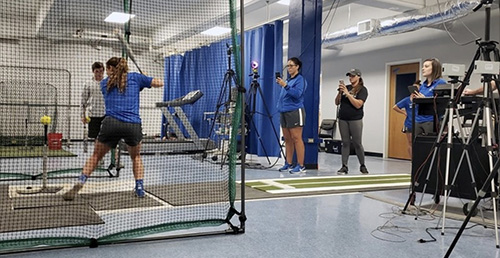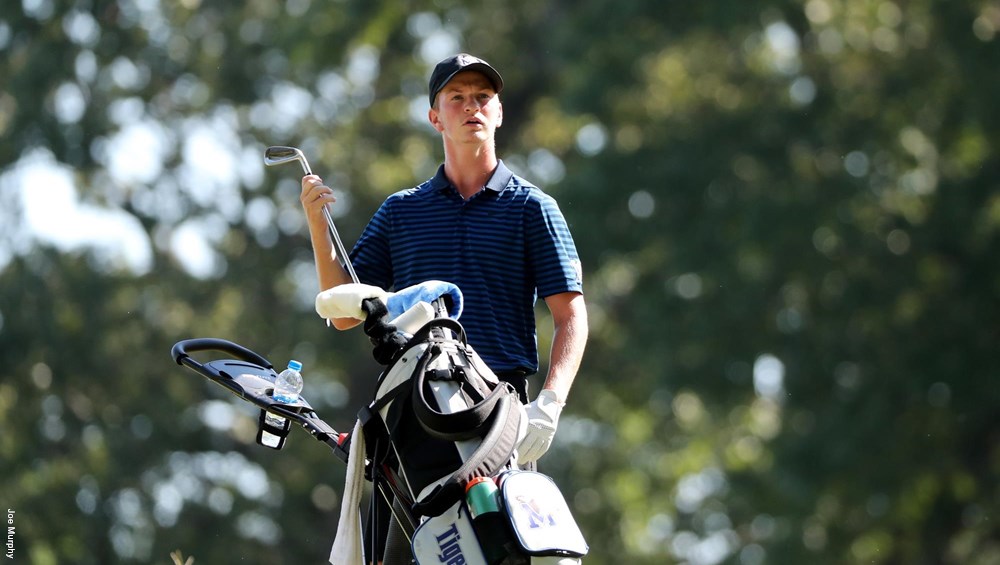Human Performance Center
Skill Improvement
Encompassing biomechanical analysis and skill acquisition science, skill improvement focuses on improving technical aspects of sport specific movements through detailed analysis and movement understanding.
Whether in the laboratory, in training or in competition, the Human Performance Center collects relevant data with a variety of specialized scientific measurement tools to provide extremely detailed understandings of movement. The science of skill acquisition and how athletes learn is then applied to help athletes adapt and change technique. Skill acquisition helps to design training environments to ensure athletes learn to perform in competition when pressure and consequences are at their highest. The combination of a detailed understanding of movement and the science of helping athletes through change is a unique area of support for Memphis Tigers Athletics.
Skill Improvement Projects
Biomechanical Analysis of Hitting (Softball)
Using data to help athletes understand, and then change, their swing mechanics to improve swing speed

Just as golf and baseball have embraced the need to hit the ball harder and further, so too softball has embraced data analytics which highlight the importance of turning singles into doubles, doubles into triples and triples into home runs. This lab-based testing used force plates under the athletes' feet and biomechanical analysis of the entire body to provide individual analysis of swing speed. Broken into the contribution of different body parts, findings are used to help the athlete move more efficiently, swing more effectively and ultimately hit the ball harder.
Key Finding: The technique of sequencing body parts is more important than ‘raw strength’ in the creation of bat speed. Individual analysis to provide key areas to develop individualized training plans is crucially important in such fast-moving tasks.
Coach + Athlete Practical Implication: Measurement and analysis provides confidence in training programs and the use of data facilitates conversation and understanding between athlete and coach.
READ MORE >Reflection for Preparation I + II (Men’s Golf)
Guiding athletes to find their own answer is the highest form of learning

With a repetition of similar errors ‘on-course’ being a challenge for college golfers, a 2-week reflection project was designed in collaboration with the head and assistant coach to shape training planning and mental and physical preparation. Specifically, questions were aimed to help athletes reflect on their behavior and attention to detail both on and off the course. Specific attention was given to mental focus, as athletes are often more able to talk with great detail about their physical planning, but don’t give as much attention to their mental planning and preparation.
Key Finding: Mental reflection helped athletes understand what makes them successful and reduced the repetition of mistakes on the golf course.
Coach + Athlete Practical Implication: As athlete development is a long-term process, it is consistency in behavior, both on and off course, which dictates success. Reflection helps to increase focus on the things that matter and stimulate athletes to engage more with training.
READ MORE >Biomechanical Analysis of Softball Pitching (Softball)
Understanding pitching mechanics to improve pitch speed and specificity of individual coaching
Speed is a key tool in the pitcher’s skill set and biomechanical analysis in a lab setting allowed analysis of segmental contributions for each athlete. Using force platers to understand the push off and impact at landing, and 3D analysis to detail the most effective movements, a detailed summary was provided to athletes and coaches to focus training on key aspects of the pitch. Skill acquisition sessions following the analysis used the data to help athletes understand their own limitations and design their own drills to fix them.
Key Finding: Every athlete had their own limitations highlighting the need for individual analysis of technical aspects of the sport.
Coach + Practical Implications: Athletes were very capable of developing their own learning drills once they were empowered to take control of their own technique.
